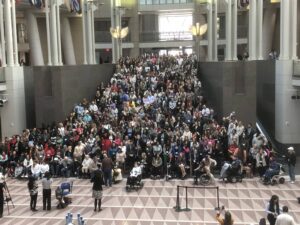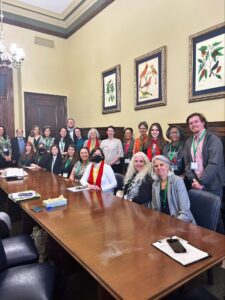, organized by the EveryLife Foundation for Rare Diseases, is one of the most important annual advocacy events for the rare disease patient community. The event is held the last week of February in order to coincide with Rare Disease Day, an international awareness event that is always recognized on the final day of February.
This year’s event started off with the rare disease film screening on Sunday evening. This year’s film, Bombardier Blood, focused on the achievements of Chris Bombardier. Chris was born with severe hemophilia, but that didn’t stop him from fulfilling an ambitious goal: summoning the highest peak on every continent in the world, including Mt. Everest. In doing so, Chris helped spread awareness about bleeding disorders.

Monday kicked off the with legislative conference, in which participants got a crash course on all of the policy asks they would be making to their representatives and senators the following day. Some of the policy asks this year included:
- Interagency Coordinating Committee on Rare Disease – Lawmakers were asked to endorse the creation of a coordinating committee that would allow government agencies involved in health and rare disease policy and research (ex. HHS, CDC, NIH, FDA, and more) to coordinate more effectively.
- Cosponsoring the Accelerating Kids’ Access to Care Act (AKACA) (HR 4758/S 2372) – This legislation would make it easier for medically complex children with rare diseases to receive treatment across state lines through CHIP or Medicaid.
- Cosponsoring the Creating Hope Reauthorization Act (HR 7384) – This bill would reauthorize the Rare Pediatric Disease Priority Review Voucher (PRV) program, a valuable incentive for the development of rare disease therapies.
- Cosponsoring and Advancing the Safe Step Act (S. 652/HR 2630) – This legislation would impose limitations on the practice of step therapy, a widespread tactic in the health insurance industry in which patients are required to start on the company’s preferred drug first, even when their doctor has prescribed them a different drug. Only once they have failed to respond to the preferred drug, which may lead to major declines in the patient’s condition or even death, would coverage of the prescribed drug be permitted.
- Asking members of Congress to join the Rare Disease Congressional Caucus, which gives voice to the rare community in legislative conditions and helps raise awareness about rare disease policy priorities.

The next day was “Hill Day” in which participants met with the offices of their reps and senators and pushed for these policy asks. Additionally, patients shared their compelling personal stories to help drive home the challenges faced by people living with a rare disease.
Wednesday featured a rare disease DEIA panel discussion, featuring speakers such as:
- Amanda de Leon, Providence St. Jude Medical Center, presenting on Access to Genetic and Genomic Testing in Hispanic/Latinx Communities
- Michael Ward, Alliance for Aging Research, presenting on Prior Authorization and Other Utilization Management Practice Challenges in Rural Communities
- William Romero, sharing about the Intersectionality of LGBTQIA+ and Rare Disease
- Ashley Valentine, Sick Cells, on Development, Approval and Access
This was followed by a briefing from the Rare Disease Congressional Caucus and the final event of the week, the Rare Artist Reception. This is one of the highlights of the week in which members of the rare disease community display artwork related to their experiences.
Patient Worthy is always honored to be included as part of this event and to help spread awareness about the event through our coverage on social media and our site.


